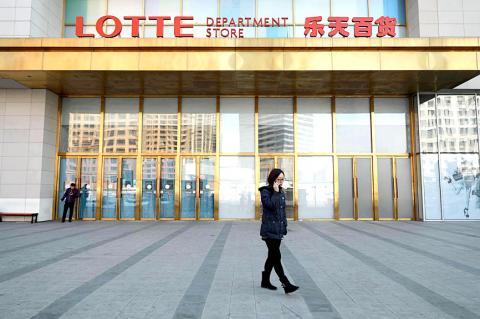Beijing travel agencies yesterday said they could no longer arrange trips to South Korea, following reports that China had ordered a clampdown to punish Seoul over its plans to host a US missile-defense system.
South Korea’s fifth-largest company, Lotte, is facing an escalating backlash in China after providing land for the military facility, which Beijing fears will undermine its own defense capabilities.
So far, Beijing has refrained from taking any public retaliatory steps against South Korea.

Photo: AFP
However, tour operators contacted by reporters confirmed the suspension of trips to South Korea, after Yonhap news agency on Thursday reported that China’s tourism administration had issued a verbal directive on the issue.
“Please consider going to other countries. Trips to South Korea are suspended due to policy and safety factors,” said a staffer at CYTS (中國青年旅行社) online service, one of China’s biggest travel companies.
Staff at two other leading travel-service providers said the same.
“You can’t register for a trip to South Korea, it’s suspended. I don’t know why, nor when it will be resumed,” an employee at BTG Travel (北京神舟國際旅行社) said.
Chinese travelers are a major and growing source of tourism revenue for South Korea.
Yonhap’s report said the ban was likely to be expanded to travel firms in other cities, citing “industry sources” in China.
Allies South Korea and the US last year agreed to install the Terminal High Altitude Area Defense (THAAD) system to counter growing nuclear and missile threats by North Korea.
The Chinese Ministry of Foreign Affairs has said THAAD “jeopardizes” regional security and has warned of unspecified consequences against Seoul and Washington.
The South Korean Ministry of National Defense on Tuesday signed a land swap deal with retail giant Lotte Group for the stationing of the system and said it would push for its deployment this year.
Lotte has already suffered business setbacks and boycott threats in China over the plan.
The China National Tourism Administration did not respond to a request for comment.
However, it posted travel tips that urged Chinese tourists to carefully consider “the risks of outbound travel” when considering trips to South Korea.
Asked about the reported travel halt, Chinese Minister of Foreign Affairs spokesman Geng Shuang (耿爽) dismissed the question during a daily briefing.
“Instead of chasing shadows and working on speculation, it’s better to focus on the concrete issue so as to avoid further damage to bilateral relations,” he said.
On Wednesday, the Chinese producer of one of the country’s most popular snacks withdrew its goods from Lotte Marts across China, saying it would “never cooperate” with the company.
A range of other actions have been taken, including a consumer boycott in Jilin Province, where protesters last weekend unfurled a banner at a Lotte Mart store saying “Lotte supports THAAD, get out of China immediately.”
Last month, Lotte was forced to halt construction of a US$2.6 billion theme-park project in northeastern China after authorities suddenly found safety problems, and Lotte Web sites have this week been downed by apparent cyberattacks.

AGING: As of last month, people aged 65 or older accounted for 20.06 percent of the total population and the number of couples who got married fell by 18,685 from 2024 Taiwan has surpassed South Korea as the country least willing to have children, with an annual crude birthrate of 4.62 per 1,000 people, Ministry of the Interior data showed yesterday. The nation was previously ranked the second-lowest country in terms of total fertility rate, or the average number of children a woman has in her lifetime. However, South Korea’s fertility rate began to recover from 2023, with total fertility rate rising from 0.72 and estimated to reach 0.82 to 0.85 by last year, and the crude birthrate projected at 6.7 per 1,000 people. Japan’s crude birthrate was projected to fall below six,

US President Donald Trump in an interview with the New York Times published on Thursday said that “it’s up to” Chinese President Xi Jinping (習近平) what China does on Taiwan, but that he would be “very unhappy” with a change in the “status quo.” “He [Xi] considers it to be a part of China, and that’s up to him what he’s going to be doing, but I’ve expressed to him that I would be very unhappy if he did that, and I don’t think he’ll do that. I hope he doesn’t do that,” Trump said. Trump made the comments in the context

SELF-DEFENSE: Tokyo has accelerated its spending goal and its defense minister said the nation needs to discuss whether it should develop nuclear-powered submarines China is ramping up objections to what it sees as Japan’s desire to acquire nuclear weapons, despite Tokyo’s longstanding renunciation of such arms, deepening another fissure in the two neighbors’ increasingly tense ties. In what appears to be a concerted effort, China’s foreign and defense ministries issued statements on Thursday condemning alleged remilitarism efforts by Tokyo. The remarks came as two of the country’s top think tanks jointly issued a 29-page report framing actions by “right-wing forces” in Japan as posing a “serious threat” to world peace. While that report did not define “right-wing forces,” the Chinese Ministry of Foreign Affairs was

PREPAREDNESS: Given the difficulty of importing ammunition during wartime, the Ministry of National Defense said it would prioritize ‘coproduction’ partnerships A newly formed unit of the Marine Corps tasked with land-based security operations has recently replaced its aging, domestically produced rifles with more advanced, US-made M4A1 rifles, a source said yesterday. The unnamed source familiar with the matter said the First Security Battalion of the Marine Corps’ Air Defense and Base Guard Group has replaced its older T65K2 rifles, which have been in service since the late 1980s, with the newly received M4A1s. The source did not say exactly when the upgrade took place or how many M4A1s were issued to the battalion. The confirmation came after Chinese-language media reported